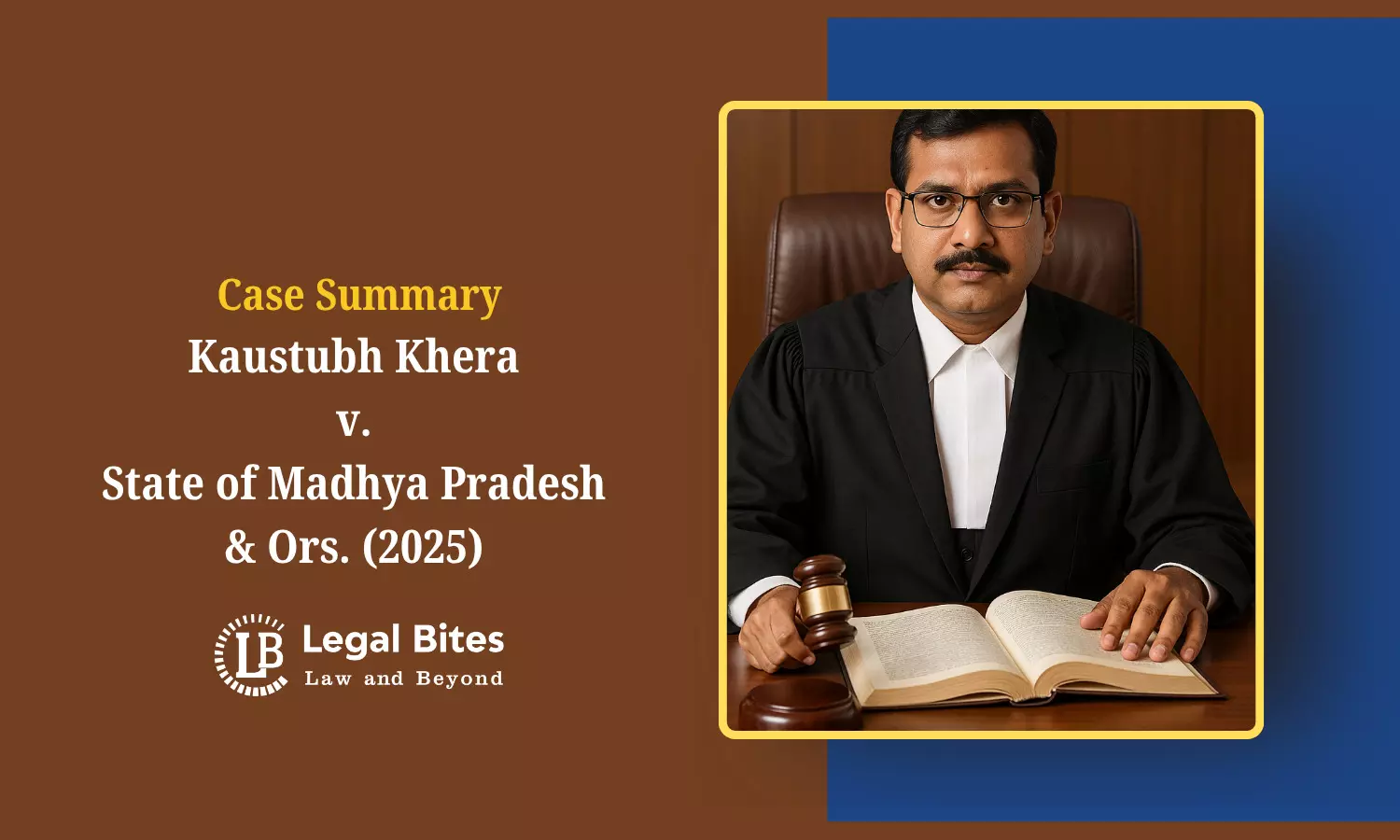
In a landmark judgment delivered on 7th May 2025, the Madhya Pradesh High Court at Jabalpur decisively upheld the discharge of a probationary Civil Judge, Kaustubh Khera, from judicial service. The ruling, passed by Chief Justice Suresh Kumar Kait and Justice Vivek Jain, clarified the scope of judicial review in such matters and reinforced the discretion of the High Court in assessing the suitability of probationary judicial officers under Rule 11(c) of the M.P. Judicial Service (Recruitment and Conditions of Service) Rules, 1994.
Background of the Case
Kaustubh Khera was appointed as a Civil Judge (Junior Division) in the M.P. Judicial Services on 12 March 2019. After over five years of probationary service, he was discharged from service via an order dated 5 September 2024, following an adverse recommendation from the High Court’s Administrative Committee, ratified by the Full Court.
The discharge order cited his failure to satisfactorily and successfully complete the probation period. Khera challenged the order in person, alleging that it was not a mere discharge simpliciter but a punitive termination based on unproven allegations of misconduct.
Petitioner’s Arguments
Khera argued that:
- His ACRs (Annual Confidential Reports) showed consistent grades of “C” (Good) and “B” (Very Good), and that his performance improved over time.
- Discrete inquiries had been initiated against him for alleged misconduct, but no formal departmental proceedings were initiated.
- He received the material used against him only under the RTI Act, post-termination.
- Complaints were fabricated by the Bar Association and court staff as retaliation for his strict disciplinary actions.
- His probation period exceeded the three-year limit specified under Rule 11(b), and hence, his confirmation should be deemed automatic.
High Court’s Observations and Reasoning
The High Court meticulously analysed the relevant rules and precedents before dismissing the petition. Key observations included:
1) Nature of the Order: The discharge was not founded on allegations of misconduct. No punitive language was used in the official resolution or termination order.
2) Discharge Simpliciter Doctrine: The Court reiterated that a probationer’s discharge does not become punitive merely because adverse material exists. Unless the termination is explicitly based on misconduct or casts a stigma, it remains a discharge simpliciter.
3) Use of Adverse Material: The Administrative Committee was entitled to examine all service records, including complaints, to assess suitability. This did not amount to punishment.
4) Judicial Precedents: The Court cited several Supreme Court decisions:
- SBI v. Palak Modi (2013): Suitability assessments during probation do not need to follow disciplinary procedures.
- Pavanendra Narayan Verma v. Sanjay Gandhi PGI (2002): Non-confirmation due to unsuitability isn’t stigmatic unless misconduct is the foundation.
- Rajesh Kohli v. High Court of J&K (2010): Probationers can be discharged for overall unsatisfactory conduct without a regular enquiry.
5) No Right to Continuation: A probationer has no vested right to be confirmed unless explicitly declared suitable by the competent authority.
6) No Automatic Confirmation: Rule 11(d) of the 1994 Rules clearly stipulates that confirmation depends on successful completion of probation and availability of a permanent post. Mere lapse of time does not confer confirmed status.
7) Validity of Extended Probation: Although probation exceeded three years, no prejudice was caused as assessments were made throughout. The petitioner remained under review, which the High Court deemed valid.
Conclusion of the Judgment
The Madhya Pradesh High Court concluded that:
- The discharge was lawful and non-punitive.
- The High Court exercised its powers under Rule 11(c) appropriately.
- The petitioner’s unsuitability was properly assessed based on overall performance.
- No violation of natural justice or service rules occurred.
Thus, the writ petition challenging the discharge was dismissed.
Significance of the Judgment
This judgment is a reaffirmation of constitutional principles concerning judicial appointments and service law. It reinforces the High Court’s authority to assess and terminate probationary judicial officers without the procedural burdens of a disciplinary enquiry, provided the termination does not rest on proven misconduct.
Additionally, the ruling underscores the vital need for judicial officers to maintain high standards of discipline, demeanour, and professionalism. The judiciary, being a pillar of justice, must remain insulated from even the perception of errant behaviour. The High Court’s careful consideration of service records, performance indicators, and complaints shows a robust mechanism of internal accountability.
Key Takeaways
- Discharge of a judicial officer on probation can be recommended by the High Court based on overall unsuitability.
- Such a decision does not require a full-fledged enquiry unless it is punitive.
- The presence of complaints or a discrete inquiry report does not automatically convert the discharge into a punitive action.
- Administrative and Full Court resolutions are binding unless shown to be arbitrary or legally flawed.
In upholding the discharge of Kaustubh Khera, the Madhya Pradesh High Court has set a vital precedent clarifying the boundaries of judicial review in probationary terminations. It draws a clear distinction between punishment and non-confirmation, thereby safeguarding both institutional integrity and procedural fairness.
Important Link
Law Library: Notes and Study Material for LLB, LLM, Judiciary, and Entrance Exams